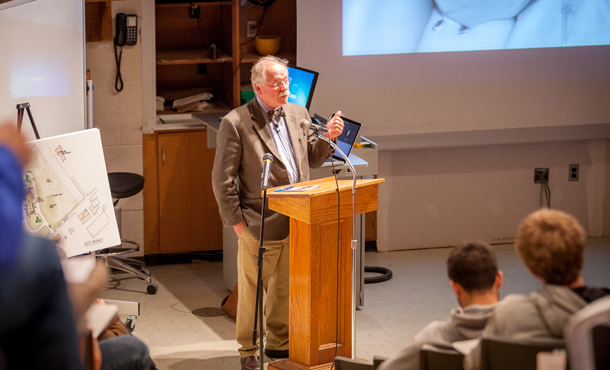Sometimes, the only action a doctor need take to save a life is to change the patient’s diet. When treatment of a life-threatening genetic disorder is so simple, the key is to catch it, not cure it.
Holmes Morton made his life’s work to study and treat genetic disorders primarily in Mennonite, Brethren and Amish communities. The physician and his wife Caroline founded the non-profit Clinic for Special Children in Lancaster County, Pennsylvania, in 1991. Morton’s work is highly acclaimed; he was awarded the Albert Schweitzer Prize for Humanitarianism in 1993 and a MacArthur Foundation “genius grant” in 2006.
Morton spoke recently at a Suter Science Seminar titled “Genomic Medicine and Plain People.” He was joined by his older brother, Paul Morton, who is helping to start similar clinics in rural areas, as well as medical historian and family friend Terry Sharrer.
Sharrer, a former curator at the Smithsonian Institute, began by telling the story of Henrietta Lacks, a Boston woman who developed a severe form of cancer. Her doctors removed some cancer cells for analysis, but they found that the cells, unlike normal cells, could divide rapidly and continuously in a Petri dish.
Without Henrietta’s consent, these multiplied cells were distributed throughout the world to aid research of cancer and other diseases. These immortal “HeLa” cells have long since outlived Henrietta, who eventually died of the disease. Henrietta Lacks was buried in an unmarked grave in the family cemetery in Halifax County, Virginia –a story that was told in the 2010 bestseller The Immortal Life of Henrietta Lacks.
This story points to a problem researchers must avoid when testing patients. Sometimes, patients “are seen as interesting subjects or paying customers, not sick people who need care,” said Sharrer.
Paul Morton then explained the logistics of running the clinic. The Clinic for Special Children has a symbiotic relationship with Lancaster County. It was built on donated Amish land and “raised” by Amish volunteers. A popular annual benefit auction, with whoopee pies and doughnuts to feed hungry bidders, continues to raise funds to help the clinic serve local families as well as the children of 34 states and 17 countries.
Morton, who spoke for most of the lecture, described genetic disorders endemic to “plain folk,” with emphasis on glutaric acidosis and maple syrup urinary disease. In glutaric aciduria, children are at risk of a stroke that damages the basal ganglia, an important nerve structure. If these children live past the risk period without the stroke, they can live normal lives. If the stroke does occur – usually before 18 months of age – children suffer irreversible damage. The stroke can be prevented easily, but only if the doctors diagnose the disease.
Maple syrup urinary disease, so named for the sweet smell it confers to urine, is another impossible-to-cure but easy-to-treat disease. It can cause an intellectual disability, but damage can be prevented with a protein-free diet.
Diagnosis before the appearance of symptoms is the key to treat these disorders, said Morton. Many genetic disorders can be remediated by simple medical treatments or procedures. If the disorders remain unseen, however, the damages they cause are often irreversible. It helps to “understand the underlying genetic background of the community,” he said.
This lecture was cosponsored by the Suter Seminar series and the Shenandoah Anabaptist Science Society. The series consists of 17 expert presentations – averaging two per month – during the fall and spring semesters. Visit emu.edu/science-seminars for information about future talks.
